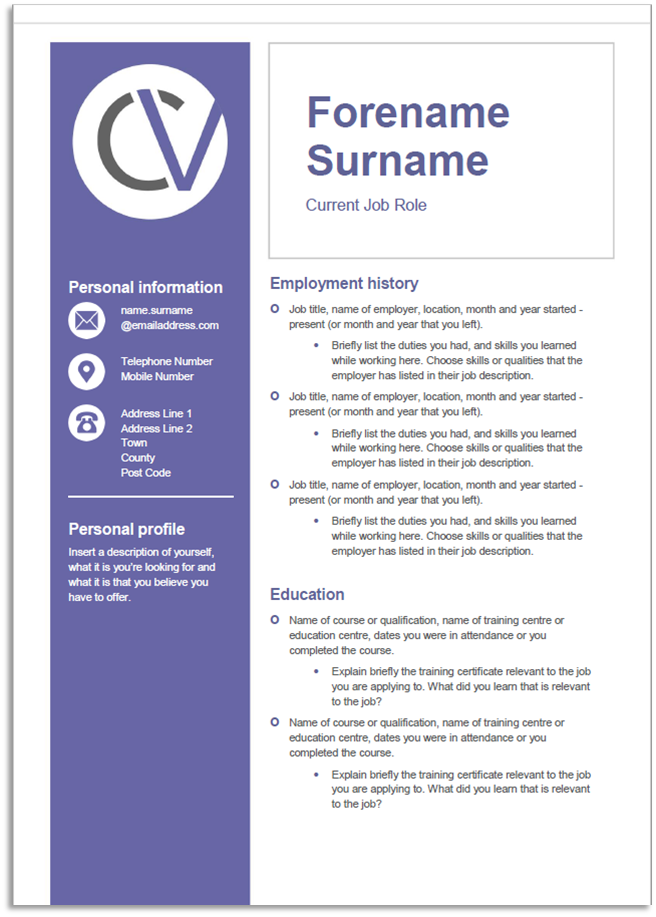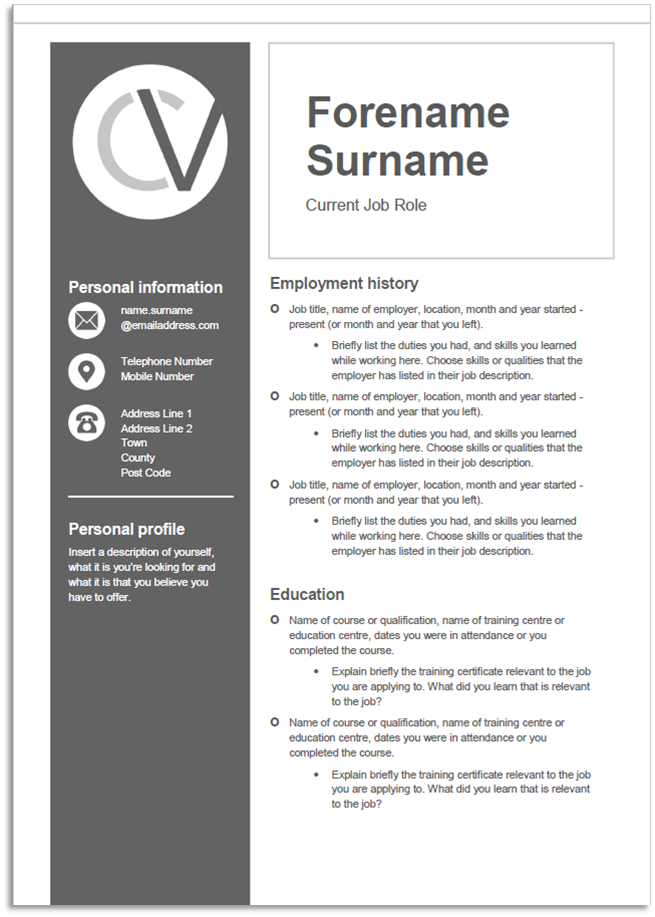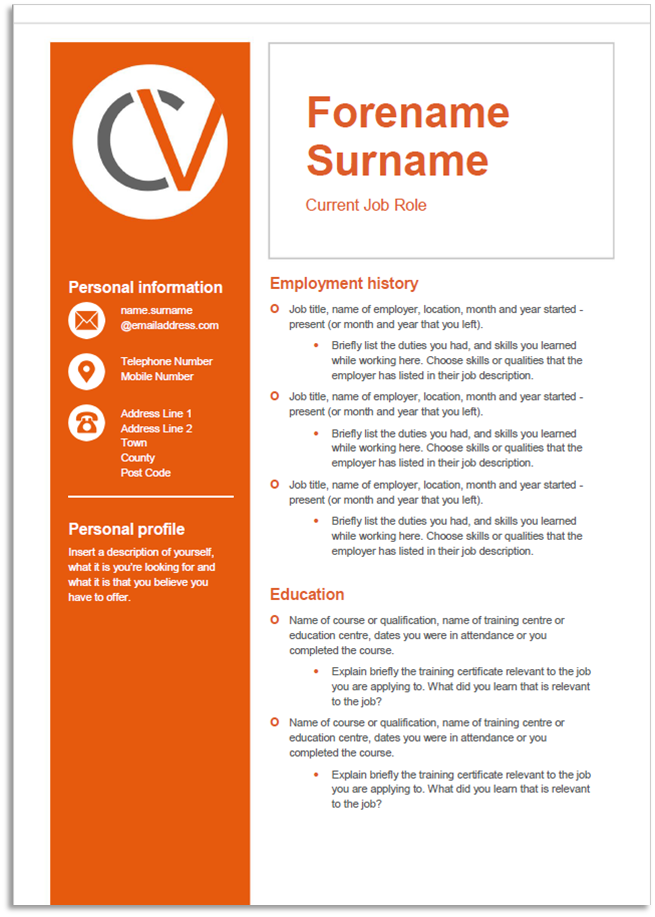If you have great leadership skills, work well under pressure, and have a passion not just for cooking but for business, you will make an excellent Sous Chef or Head Chef.
Our free CV templates will help you write a tailored CV to ensure you stand out from the crowd.
A guide to writing a CV for a job as a Sous Chef or Head Chef
Name: Anna Russell
Tel No: 0000 0000 00
Email: AnnaRussell@email.com
Address: 48 Town Lane
Holt
NR99 0FD
Personal Profile
In the personal profile, you should professionally introduce yourself, in three or four sentences, with relation to the job you’re applying to.
A good personal profile will include: your current work situation, what type of work you are searching for (such as part-time, flexible hours, or full-time employment starting immediately) some key skills and/or traits that will show the potential employer that you are a good candidate for the advertised job.
For a job as a sous or head chef, this is the perfect place to communicate your passion for cooking and business, as well as your leadership skills.
EXAMPLE:
I am a dedicated sous chef with four years’ experience in this position. I am looking to step up into a challenging head chef role that will enable me to shape an excellent gastro pub menu. I love using seasonal products to create delicious and beautiful dishes, and enjoy leading a team that’s always ready to deliver a smooth service.
Work History
The work history section is the your chance to highlight the skills and experience your current and previous jobs have given you. Ideally use this section to show potential employers why you are a good fit for the job you’re applying for by including skills and experience relevant to the job you're applying for. You don’t need to include every last detail, just pick the best parts. You can always write down and save your examples and other skills for the interview.
Try to include your work history for the last five years. Past the five year mark, you can be more brief with the details you give for each role. For example, if you’re applying for a head chef role, and you’re including your first ever commis chef role, it’s okay to just list the basic details, as your most recent experience is the most interesting.
- Job title, name of employer, location, month and year started – present (or month and year that you left)
- Briefly list the duties you had, and skills you learned while working here. Choose skills or qualities that the employer has listed in their job description
EXAMPLE:
- Sous chef, Morston Hall, North Norfolk, June 2016 – present
- Responsible for assisting the head chef in all areas of running this Michelin Star fine dining restaurant
- Duties include running the pass during service, stock orders, food storage and preparation, training chefs on sections, supporting apprentices, and helping to create specials and new menu items
What jobs should you include?
- You should include all of your previous roles in kitchens, which are relevant to this job application, and briefly outline your responsibilities in each one. You will likely put the most detail in your most recent jobs as these are the most relevant.
- Most potential employers will know what it means to be a chef de partie in a restaurant, so use the job description to guide you on which parts to include. This is your chance to highlight the skills that they’re looking for, using your previous jobs to provide examples. Try not to be too repetitive, for example you don’t need to say that you’ve improved your knife skills in each chef role you’ve ever done. Try to be concise, giving only the best examples for each skill and role.
Education History
In education history, this is a chance to show any relevant training you have done, what skills you’ve learned, as well as general education subjects you’ve done at school or college. Naturally, as your work history becomes more relevant and more recent, this section becomes shorter. But it’s still important not to leave things out, you never know you might have gone to the same college as the chef reading it, giving you something in common to talk about at an interview.
It's possible to progress to Sous Chef from on the job training but generally Sous Chefs would have acquired an NVQ Level 2 (or equivalent) in Food Production and a Level 2 Food Safety Certificate.
Again, it's possible to progress to Head Chef through on the job training but generally Head Chefs are expected to have an NVQ Level 3 (or equivalent) in Professional Cookery. They are also expected to have a Level 3 Food Safety Certificate.
Courses or certificates in things like food safety, COSHH (Control of Substances Hazardous to Health) and first aid should also be included here.
- Name of course or qualification, name of training centre or education centre, dates you were in attendance or you completed the course
- Explain briefly the training certificate relevant to the job you are applying to. What did you learn that is relevant to the job?
EXAMPLE:
- Professional Cookery Level 3 NVQ Diploma, Havering College, September 2006 – May 2008
- Learned the basics of cooking theory, knife skills, presentation, pastry and baking, sauces, making terrines, advanced butchery techniques and fine-dining desserts
Skills
Here is your chance to highlight the best skills you have in relation to the job you’re applying for. Hint: these will be the skills listed in the job advert, but only highlight the skills you have and examples from your own experience. Misleading information on your CV is likely to trip you up in an interview and is unprofessional; you don’t have to show you have every last skill listed in the job advert to be successful.
EXAMPLE:
- Leadership and problem solving skills – ‘Through running the pass and managing the kitchen when the head chef was off or unavailable, I have improved my ability to lead the kitchen team. By learning how to delegate tasks, assess where my help was needed the most and deal with problems that arose during the day I enabled good services. I found leading by example and encouraging questions is a good way to get the most out of junior chefs.’
- Communication – ‘I have learned how to communicate effectively with the front of house manager and team. This is especially important when it came to explaining new menu items, and understanding the dietary and allergy needs of customers. Being able to do this in the heat of the moment during service is important to not disrupt the rest of the orders.’
- Organisation – ‘Being responsible for stock takes and health and safety paperwork has helped me to improve my organisation. I realised that these tasks are just as important as good cooking, and essential to running a successful kitchen.’
References
First and last name
Job title and relation to you in the work place (if it isn’t obvious from the job title), name of work place, work contact number (or main company phone number which they can be reached through) and work email address.
EXAMPLE:
Faith Butler
Head chef, Morston Hall
0000 0000 00
FaithButler@email.com
Who should you include as a reference?
- The first reference should ideally be from your most recent head chef or executive chef. The second reference can be from a manager or chef from a previous job.
- It’s best practice to ask someone if they will be a reference for you before they are contacted. Be aware that not all employers actually contact references, particularly at this level in hospitality, but it’s important to have them available if needed.
- It’s important to remember that while you are in your current job, consider that you may not want your reference (eg. your current head chef/boss) to be contacted until you have had an interview for a new possible job, or are actually offered it. This is because, for instance, if you weren’t offered the new job, and end up staying in your current job then you might not want your manager having been contacted as a reference. It can cause tension or awkward conversations about why you were trying to leave. A good way to get around this is to simply write ‘References available on request’. This shows the new employer that they can ask you for them as needed, but also means you can ask them to only contact them if you are offered the job, and then have time to ask the reference if it’s okay for them to be contacted. Most potential employers will be happy to wait to do this after offering you the job, and understand the reasons why.





